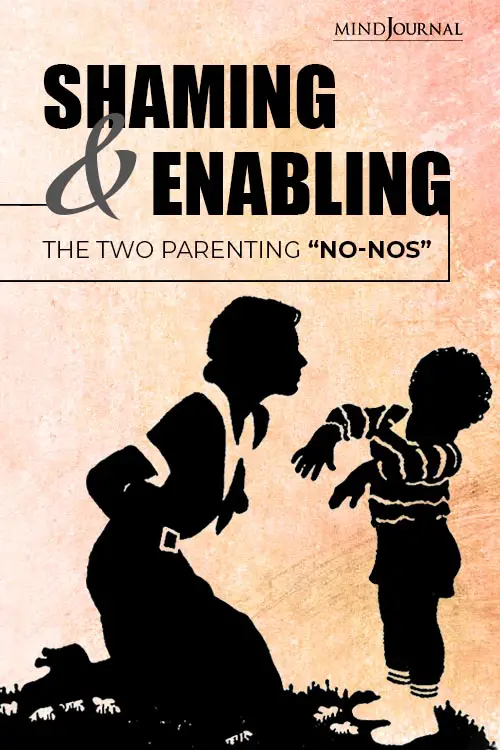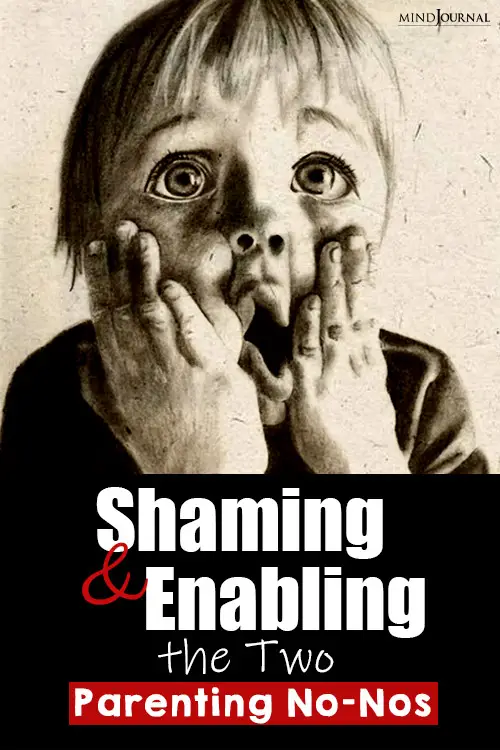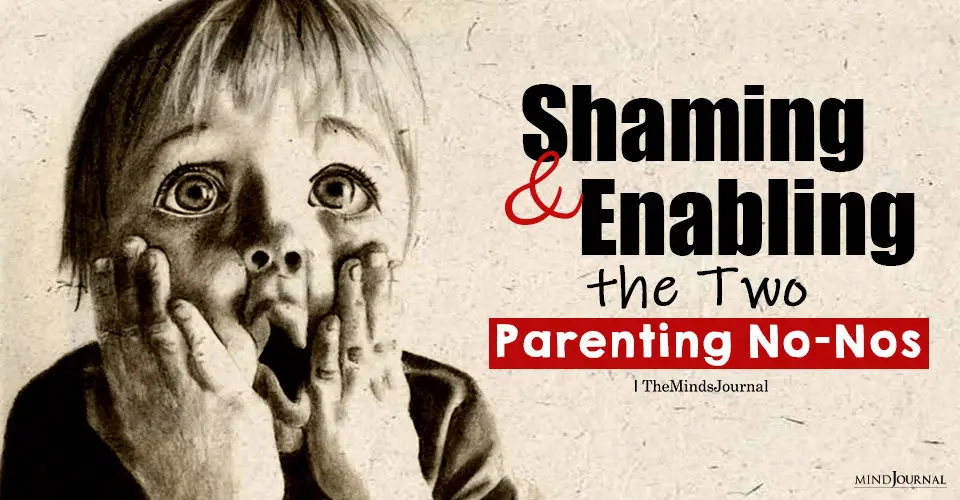Two of the most common mistakes parents tend to make when it comes to raising their children are shaming and enabling them. Shaming and enabling in the name of discipline can sometimes backfire very badly and will end up doing more harm than good. Handling every situation with positivity, open-mindedness, and patience should be what every parent should aspire for.
Refusing to hold a child accountable is detrimental to the child’s development of character. A parent who is perpetually searching for a teacher, coach, or another child to scapegoat in place of holding his or her child responsible may be undermining a child’s strides towards emotional health. Similarly, a parent who attempts to bend the rules for a child in order to shield the child from disappointment may also be short-circuiting a child’s resiliency.
However, swinging too far in the opposite direction and shaming a child for a mistake or failure is not the answer either. The solution lies in the middle.
The mantra, “It’s not what happens to a child, it’s how a parent helps a child through it,” may be the golden rule. A parent who shames a child is not a parent who helps a child through a rough patch or assists a child in gaining insight.
For example, say a child denies having homework because he wants to play with his friends. The next day, he is caught scrambling to complete the assignment before class. The teacher reprimands the child and assigns him a zero for the project. A parent who enables and shames a child is tempted to contact the teacher and demand the child receive points for the work that was completed. At home, the parent yells at the child and calls him a “liar.”
Read 25 Effective Parenting Rules For Mothers With Sons
On the other hand, a parent who respects the teacher’s stance and calmly sits down with the child to discuss the matter is a parent attempting to understand, not enable. Empathizing with the child’s feelings: “I get it. You didn’t want to miss out on time with your friends. You are afraid of being left out. I understand. But, honey, homework comes first. I’d like you to finish the project tonight and turn it in tomorrow.”
When the child becomes aware of the feelings which compel the negative behavior, the child gains insight. Understanding emotions prevent a child from acting them out inappropriately. This helps a child gain self-awareness and insight. Next, the parent reinforces accountability.
The child is likely to pitch a fit because he does not want to do the work without getting credit. The parent empathizes again, yet upholds the expectation: “You are angry. I get it. It’s frustrating to complete a project knowing it won’t improve your grade, but it may remind you to do your work the first time.”
It may also be necessary to sit with the child to reinforce and encourage him to follow through. Paying bills or responding to emails while sitting at the table with the child allows the parent the opportunity to calmly reinforce the expectation by his or her close physical presence. Most importantly, this approach also communicates to the child that the parent values hard work more than an outcome. Effort and integrity are prioritized over a good grade.
Often when a parent only recognizes a child’s achievements and overlooks validating who the child is, the child believes she is only as good as the next achievement. Winning becomes everything. The child’s self-esteem is based on performance and perfection instead of a grounded sense of self. Often, a parent who derives satisfaction from how the child makes him or her look instead of prioritizing the child’s emotional needs may be compromising the child’s mental health.
Unfortunately, a parent who puts his or her feelings first may tend to punish a child for having a feeling that is contradictory. Continually shaming a child for feeling differently may be inhibiting the child’s ability to consolidate his or her sense-of-self. For example, say a child asks to spend some of his birthday money on a “treasure” he finds at a garage sale. His mom is experiencing significant financial stress and is trying to declutter her house to sell. She is wholeheartedly against wasting money on garage sale junk, but before telling her son “no,” she remembers her promise to him. She agreed that he could spend a portion of his birthday money on something he chose.
Read The 4 Common Parenting Styles and Their Effects on Kids
Instead of shaming him for having a different feeling than her, she says, “You really have your heart set on what you found at the garage sale. I get it. I’m not crazy about the idea of bringing more stuff into this house, but I did promise you that you could spend some of your birthday money when you found something you really wanted.” The mom reluctantly gives her blessing and he jumps on his bike and peddles off.
When he returns, he proudly hands her a tattered and faded record album (her favorite band). The mom is so shocked and touched at the gift that she tears up and embraces him. She is suddenly very grateful she didn’t “shame her child into submission.” She validates his kind and thoughtful heart and tells him, “I love who you are.”
Another important difference between helping and enabling involves a parent’s handling of a child’s experience of disappointment. A parent desperately wants a child to succeed, not only because it’s important to the child’s future, but also because it may enhance a child’s self-esteem. Yet, it is easy to get caught up in a child’s successes.
For example, say a child is competing in her school’s science fair. She asks her parent for help deciding on a project idea. The parent is excited for the child and naturally wants the child to succeed. She is caught up in the moment and subtly and unintentionally takes over. The child eventually loses interest because the parent is ignoring her ideas. The child follows the parent’s instructions but takes a back seat with the project. Although the child wins first place, she feels little satisfaction and compensates by boasting to her friends just as her mom is bragging to her’s.
A better approach may be to value the effort the child puts forth rather than the outcome. Encouraging and empowering the child may be the best way to help. Partnering with the child when she asks for assistance is also important. “I can center the title, but you can place and glue the letters.” Starting the child off in a small way may be helpful but encourage her to take over and finish. Validating the child’s hard work and ideas is vital.
If the child is disappointed with the outcome, a parent has the opportunity to help by empathizing. “You are so disappointed. I get it. You thought you were going to be recognized. It’s disappointing, but you put forth a lot of effort. I am so proud of you. You’re a hard worker. I love that about you.” These statements honor how the child feels and validate who the child is.
If a parent is empathizing correctly, he or she is not rejecting how the child feels. Statements that negate a child’s emotional state are not always helpful, for example: “don’t be disappointed,” “don’t worry,” or “don’t be mad.” First, honor the child’s feelings, then correct, reassure, or problem-solve.
For example, “It is a big worry. I get it. I’ll be here for you if that worry happens. I’ll try and help. You won’t be alone with it.”
“You are mad. I would be too, but you cannot throw your backpack. Please go pick it up.”
“You are disappointed. You have every right to be. But, keep at it. You’ll get it.”
Read Anxiety In Children: 15 Calming Things You Can Say As A Parent
As a parent, the goal is to raise a child who is accountable, hardworking, and emotionally intelligent. A child’s achievements have little correlation with these characteristics. It’s not what happens to a child, it’s how a parent helps the child through it. Empathize, but uphold expectations. Value character over achievement and attempt and to keep the parental ego in check.
References:
https://psycnet.apa.org/record/1992-97915-013
Written By Erin Leonard
Originally Appeared In Psychology Today










Leave a Reply
You must be logged in to post a comment.